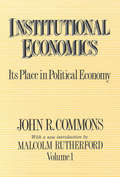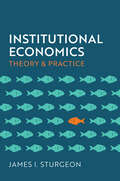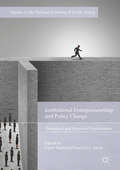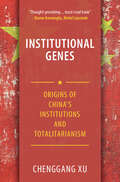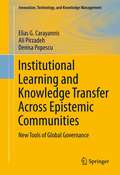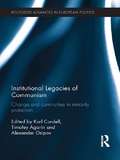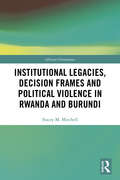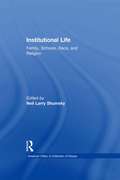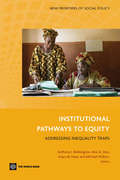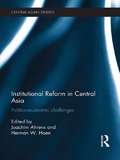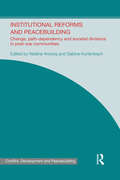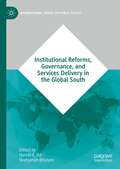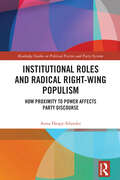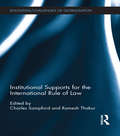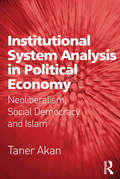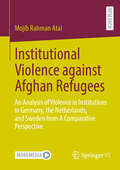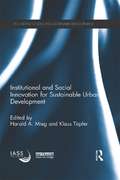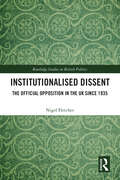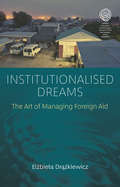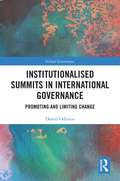- Table View
- List View
Institutional Economics: Its Place in Political Economy, Volume 1
by John R. CommonsCommons opened Institutional Economics by declaring: ""My point of view is based on my participation in collective activities, from which I here derive a theory of the part played by collective action in control of individual action."" This sentence well summarizes the three key elements of this book--its theoretical intent, the importance Commons gave to his own experience in institutional reform in shaping these ideas, and the focus on the concept of the institution as a collective constraint on individual action.
Institutional Economics: Theory and Practice
by James I. SturgeonInstitutions are the controlling force at the center of any economy. They organize and control all economic activity from markets to producers, consumers to governments, and more. Institutions determine how fundamental economic questions such as, what, how, and for whom, are answered. Thus, scientific analysis of economic activity requires a deep and systematic understanding of institutions. This much-needed text provides students with a comprehensive introduction to the increasingly influential field of Institutional economics. Across its ten chapters, it unpacks the history, theory, applications, policies, and methods of Institutional economics, carefully blending theoretical, conceptual and empirical elements that together illuminate the complexity of the modern economy. Topics covered include production, consumption, class and distribution, development, value theory, and specific institutions including the corporation, property, labor, and government. Each chapter concludes with selected questions or issues posed as a basis for class discussion and further research. Written in a lively and accessible style for students new to the topic, this book is set to become the go-to resource for classes on institutional economics across the world.
Institutional Entrepreneurship and Policy Change
by Caner Bakir Darryl S. JarvisThis book is about the role of agents in policy and institutional change. It draws on cross-country case studies. The focus on ‘agency’ has been an important development, enabling researchers to better reveal the causal mechanisms generating institutional change (i.e., how institutional change actually takes place). However, past research has generally been limited to specific intellectual silos or scholarly domains of inquiry. Policy scholars, for example, have tended to focus on the various mechanisms and levels at which agency operates, drawing on institutionalist perspectives but not always actively contributing to institutionalist theory. Institutionalist perspectives, by contrast, have tended to operate at macro-levels of enquiry, embracing the ontological primacy of institutions in processes of isomorphism but not necessarily contributing to or embracing policy perspectives that engage in more granular analyses of policy making processes, implementation, and the instantiation of institutional and policy change. Despite the obvious complementarities of these two intellectual traditions, it is surprising how little collaborative work, or indeed cross fertilization of theory and analytical design has occurred. The core novelty of this volume is thus its focus on agential actors within institutional settings and processes of entrepreneurship that facilitate isomorphism and policy change. The book’s theoretical framework is grounded in variants of institutional theory, especially historical, sociological and organisational institutionalism and policy entrepreneurship literature. The overall conclusion is that that both institutionalists and public policy scholars have largely overlooked the importance of complex interactions between interdependent structures, institutions, and agents in processes of institutional and policy change.
Institutional Games and the U.S. Supreme Court (Constitutionalism and Democracy)
by James R. Rogers Roy B. Flemming Jon R. BondOver the course of the past decade, the behavioral analysis of decisions by the Supreme Court has turned to game theory to gain new insights into this important institution in American politics. Game theory highlights the role of strategic interactions between the Court and other institutions in the decisions the Court makes as well as in the relations among the justices as they make their decisions. Rather than assume that the justices' votes reveal their sincere preferences, students of law and politics have come to examine how the strategic concerns of the justices lead to "sophisticated" behavior as they seek to maximize achievement of their goals when faced with constraints on their ability to do so. In Institutional Games and the U.S. Supreme Court, James Rogers, Roy Flemming, and Jon Bond gather various essays that use game theory to explain the Supreme Court's interactions with Congress, the states, and the lower courts. Offering new ways of understanding the complexity and consequences of these interactions, the volume joins a growing body of work that considers these influential interactions among various branches of the U.S. government.Contributors:Kenneth A. Shepsle, Andrew De Martin, James R. Rogers, Christopher Zorn, Georg Vanberg, Cliff Carrubba, Thomas Hammond, Christopher Bonneau, Reginald Sheehan, Charles Cameron, Lewis A. Kornhauser, Ethan Bueno de Mesquita, Matthew Stephenson, Stefanie A. Lindquist, Susan D. Haire, Lawrence Baum
Institutional Genes: Origins of China's Institutions and Totalitarianism
by Chenggang XuThis book explores the origins and evolution of China's institutions and communist totalitarianism in general. Contemporary China's fundamental institution is communist totalitarianism. Introducing the concept of “institutional genes” (IGs), the book examines how the IGs institutional genes of Soviet Russia merged with those of the Chinese imperial system, creating a durable totalitarian regime with Chinese characteristics – Regionally Administered Totalitarianism. Institutional Genes are fundamental institutional elements that self-replicate and guide institutional changes and are empirically identifiable. By analyzing the origins and evolution of IGs institutional genes in communist totalitarianism from Europe and Russia, as well as those from the Chinese Empire, the Chinese Communist Revolution, the Great Leap Forward, the Cultural Revolution, and post-Mao reforms, the book elucidates the rise and progression of communist totalitarianism in China. The ascent of communist China echoes Mises' warning that efforts to halt totalitarianism have failed. Reversing this trend necessitates a thorough understanding of totalitarianism.
Institutional Grammar: Foundations and Applications for Institutional Analysis
by Saba Siddiki Christopher K. FrantzThis book provides a comprehensive introduction to the Institutional Grammar, an approach for analyzing the design of institutions. To lay the foundation for the application of the Grammar for different application areas, the book first provides a background of the IG, before motivating the introduction of an updated version of the Institutional Grammar, called the Institutional Grammar 2.0 that aims at representing institutions more comprehensively and with greater validity. The book then turns to applications and introduces methodological guidance alongside expositions of emerging analytical applications of the “Grammar” that include presentations of current practice, as well as developing novel analytical opportunities that the analyst can apply or build upon for their application. This book is aimed at students, faculty, and practitioners of diverse disciplinary backgrounds with varying levels of understanding of institutional analysis and experience conducting it.
Institutional Learning and Knowledge Transfer Across Epistemic Communities
by Elias G. Carayannis Ali Pirzadeh Denisa PopescuOver the past several decades, as the pace of globalization has accelerated, operational issues of international coordination have often been overlooked. For example, the global financial crisis that began in 2007 is attributed, in part, to a lack of regulatory oversight. As a result, supranational organizations, such as the G-20, the World Bank, and the International Monetary Fund, have prioritized strengthening of the international financial architecture and providing opportunities for dialogue on national policies, international co-operation, and international financial institutions. Prevailing characteristics of the global economic systems, such as the increasing power of financial institutions, changes in the structure of global production, decline in the authority of nation-states over their national economy, and creation of global institutional setting, e.g., global governance have created the conditions for a naturally evolving process towards enabling national epistemic communities to create institutions that comply with global rules and regulations can control crises. In this context, transfer of technical knowledge from the larger organizations and its global epistemic communities to member communities is becoming a policy tool to "convince" participants in the international system to have similar ideas about which rules will govern their mutual participation. In the realm of finance and banking regulation, the primary focus is on transfer of specialized and procedural knowledge in technical domains (such as accounting procedures, payment systems, and corporate governance principles), thereby promoting institutional learning at national and local levels. In this volume, the authors provide in-depth analysis of initiatives to demonstrate how this type of knowledge generated at the international organization level, is codified into global standards, and disseminated to members, particularly in the developing world, where the legal and regulatory infrastructure is often lacking. They argue that despite the challenges, when a country intends to join the global system, its institutions and economic structures need to move toward the global norms. In so doing, they shed new light on the dynamics of knowledge transfer, financial regulation, economic development, with particular respect to supporting global standards and avoiding future crises.
Institutional Legacies of Communism: Change and Continuities in Minority Protection (Routledge Advances in European Politics)
by Timofey Agarin Karl Cordell Alexander OsipovTwenty years after the demise of communist policy, this book evaluates the continuing communist legacies in the current minority protection systems and legislations across a number of states in post-communist Europe. The fall of communism and the process of democratisation across post-communist Europe led to considerable change in minority protection with new systems and national political institutions either developed or copied. In general, the new institutions reflected the practices and experiences of (western) European states and were installed upon advice from European security organisations. Yet many ideas, legislative frameworks, policies and practices remained open to interpretation on the ground. With case studies on a diverse set of post-communist polities including Slovakia, Bosnia, Macedonia, Ukraine, Estonia, Croatia, the Baltic States and Russia, expert contributors consider how the institutional legacies of the communist past impact on policies designed to support minority communities in the new European democracies. Providing unique empirical material and comparative analyses of ethnocultural diversity management during and after communism, this book will be of interest to students and scholars of international relations, European politics, political geography, post-communism, ethnic politics, nationalism and national identity.
Institutional Legacies, Decision Frames and Political Violence in Rwanda and Burundi (African Governance)
by Stacey MitchellRwanda and Burundi are strikingly similar countries that underwent democratization in the early 1990s. In both, resistance to democratic reforms led to coups d’état and presidential assassinations. A conundrum arises in terms of what transpires next. In Rwanda, total genocide was perpetrated by extremist Hutu actors, including government officials, upon the country’s Tutsi and politically moderate Hutu populations. In Burundi the coup d’état failed and instead ushered in a lengthy period of civil war. This divergence in outcome is puzzling given the similarity of these two countries, and it is not adequately explained by studies that address collective violence in each. This book utilizes an integrative approach that facilitates the formation of an explanation that more fully accounts for variation in the type of collective violence that occurred in Rwanda and Burundi. Showing that political actors – during periods of major institutional change – do not all respond to or perceive reform in the exact same manner or in a necessarily rational manner, this book makes an important contribution to the literature on ethnic conflict, collective violence and democratization in Africa.
Institutional Life: Family, Schools, Race, and Religion (Essays on Mexico Central South America)
by Neil Larry ShumskyFirst Published in 1996. Volume 8 in the 8-volume series titled American Cities: A Collection of Essays. This series brings together more than 200 scholarly articles pertaining to the history and development of urban life in the United States during the past two centuries. Volume 8 discusses several institutions that are uniquely urban: voluntary associations, vigilance committees, and organized police forces. These articles attempt to consider race and ethnicity class, gender, and the various experiences of different groups of Americans.
Institutional Origins of Islamist Political Mobilization
by Quinn MechamMuslim countries experience wide variation in levels of Islamist political mobilization, including such political activities as protest, voting, and violence. Institutional Origins of Islamist Political Mobilization provides a theory of the institutional origins of Islamist politics, focusing on the development of religious common knowledge, religious entrepreneurship, and coordinating focal points as critical to the success of Islamist activism. Examining Islamist politics in more than 50 countries over four decades, the book illustrates that Islamist political activism varies a great deal, appearing in specific types of institutional contexts. Detailed case studies of Turkey, Algeria, and Senegal demonstrate how diverse contexts yield different types of Islamist politics across the Muslim world.
Institutional Pathways to Equity: Addressing Inequality Traps
by Michael Walton Timothy Kessler Anthony BebbingtonQuestions of equity and inequality have moved to the center of debates on development and poverty reduction. This reflects growing awareness that even countries with high rates of growth can experience stagnating or increasing inequality, and that inequality can itself limit the poverty reducing effects of growth. Indeed, recent work indicates that, in addition to its intrinsic value, equity should be valued for its positive impacts on growth and the poverty-reducing effects of such growth. These concerns are coupled with questions of governance. This is because institutional arrangements affect not only overall rates of growth but also the distributional effects of growth, and are themselves more or less equitable in their structure and functioning. How given institutional arrangements emerge over time, with their implications for growth and equity, remains less understood. 'Institutional Pathways to Equity: Addressing Inequality Traps' tackles the relationship between equity and development, the place of institutions in determining these relationships, and the conditions under which particular institutional arrangements can either block or promote transitions toward more equitable forms of development. The chapters, originally commissioned as background documents for the preparation of the World Development Report 2006, are prepared by leading scholars from the fields of economics, political science, sociology, geography, and development studies. The book speaks directly to current discussions on inequality, poverty, and growth and will contribute to the construction of a historically informed political economy of development. The book specifically highlights the importance of inequality, institutional change through social mobilization, and institutional change through state policies. The authors show that, under certain conditions, state institutions can and have taken a leading role in promoting policies to redress inequitable social relations and so weaken the social foundations of inequality traps.
Institutional Reform in Central Asia: Politico-Economic Challenges (Central Asian Studies)
by Joachim Ahrens Herman W. HoenThe countries of Central Asia are increasingly the focus of intense international attention due to their geopolitical and economic importance as well as their unsettled transition processes. The region faced enormous challenges when the Soviet Union disintegrated, and this book focuses on the reforms of the institutional environment that have been largely neglected. Through an interdisciplinary approach, the book explores key aspects of institution building as well as economic and political governance in Central Asia. Contributors from a variety of disciplines, such as economics, political economy, political science, sociology, law, and ethnology, investigate the challenges of institutional transition in a non-democratic region. The book discusses how the lack of effective institution building as well as rule enforcement in the economic and political realms represents one of the key weaknesses and drawbacks of transition, and goes on to look at how crafting market institutions will be of utmost importance in the years ahead. Making an important contribution to understanding of political-economic developments in Central Asia, this book is of interest to students and scholars of political economy, comparative economics, development studies and Central Asian studies.
Institutional Reforms and Peacebuilding: Change, Path-Dependency and Societal Divisions in Post-War Communities (Studies in Conflict, Development and Peacebuilding)
by Nadine Ansorg Sabine KurtenbachThis book deals with the question how institutional reform can contribute to peacebuilding in post-war and divided societies. In the context of armed conflict and widespread violence, two important questions shape political agendas inside and outside the affected societies: How can we stop the violence? And how can we prevent its recurrence? Comprehensive negotiated war terminations and peace accords recommend a set of mechanisms to bring an end to war and establish peace, including institutional reforms that promote democratization and state building. Although the role of institutions is widely recognized, their specific effects are highly contested in research as well as in practice. This book highlights the necessity to include path-dependency, pre-conflict institutions and societal divisions to understand the patterns of institutional change in post-war societies and the ongoing risk of civil war recurrence. It focuses on the general question of how institutional reform contributes to the establishment of peace in post-war societies. This book comprises three separate but interrelated parts on the relation between institutions and societal divisions, on institutional reform and on security sector reform. The chapters contribute to the understanding of the relationship between societal cleavages, pre-conflict institutions, path dependency, and institutional reform. This book will be of much interest to students of peacebuilding, conflict resolution, development studies, security studies and IR.
Institutional Reforms, Governance, and Services Delivery in the Global South (International Series on Public Policy)
by Hamid E. Ali Shahjahan BhuiyanThis edited book explores the link between institutional reforms, governance and services delivery in the Global South, mapping how and to what extent resource-poor governments deliver public services to their citizens. The book concludes that delivery of public services responsibly and efficiently remains largely unachievable because of weaker institutions and poor quality of governance in the Global South countries. Reforms to governance and institutions are generally considered fitting measures to overcome public service delivery challenges.
Institutional Research Initiatives in Higher Education
by Nicolas A. Valcik Jeffrey Alan JohnsonAmerican higher education faces a challenging environment. Decreasing state appropriations, rising costs, and tightening budgets have left American colleges and universities scrambling to achieve their missions with ever more limited resources. Campus leaders have therefore increasingly relied upon institutional research and strategic planning departments to make transparent and rational decisions and to promote good stewardship of critical but finite resources. Institutional Research Initiatives in Higher Education illustrates the wealth of institutional research activities occurring in American higher education. Featuring chapters by a prominent mix of authors representing community colleges, traditional undergraduate institutions, land grant institutions, research and flagship universities, and state agencies, this book provides numerous insights into the contemporary challenges, innovative programs, and best practices in institutional research. With contributors from a variety of regions and types of institutions, each chapter provides rigorous analysis of campus-based research activities in areas such as strategic planning, admissions and enrollment management, assessment and compliance, and financial planning and budgeting. Like the departments it studies, Institutional Research Initiatives in Higher Education is an invaluable resource for university administrators, researchers, and policymakers alike.
Institutional Roles and Radical Right-Wing Populism: How Proximity to Power Affects Party Discourse (Routledge Studies on Political Parties and Party Systems)
by Anna Heapy-SilanderThis book examines how the proximity to government and different institutional roles–being in opposition, government or supporting a minority government–influence European radical right-wing populist (RRWP) parties’ discourse.Analysing case studies of different institutional roles – Finns Party (opposition), Fidesz (government) and the Danish People’s Party (supporting a minority government) – the book presents how the framing of the RRWP’s ideology and policies adapt to decision-making and power. It investigates whether there are alternative factors which better explain the possible changes in tone – such as domestic or foreign events – and finds that the party discourse is such a robust and identifying character of the RRWP parties that the different institutional roles do not moderate as previously thought.This book is of key interest to scholars and students of the radical right, party politics, populism, policymaking and, more broadly, European and comparative politics.
Institutional Supports for the International Rule of Law (Challenges of Globalisation)
by Ramesh Thakur Charles SampfordThe rule of law is widely seen as the cornerstone of any effective polity and increasingly a vital component of the international political system. If the international rule of law were to be strengthened, it would greatly contribute to trade, security, human rights and global cooperation in a range of fields. Yet, in many areas the rule of law seems almost absent in international affairs. This book explores the institutions that support the effectiveness of the rule of law domestically. It focuses on the extent to which similar institutions already exist at international level and analyses the possibility of their further development. The authors speculate on how the international rule of law might be advanced in the future, thereby suggesting potential strategies for strengthening the international rule of law. Adopting an interdisciplinary approach and combining the fields of international relations, politics and law, this book covers a range institutions including: UN Security Council International Court of Justice Human rights machinery Regional human rights International Criminal Court World Trade Organization International Tribunal for the Law of the Sea UN Department of Peacekeeping Operations. It will be of strong interest to students and scholars of international relations, international organisations, global governance, international law, migration law, international peace and security law, applied ethics, political economy, political science and sociology.
Institutional System Analysis in Political Economy: Neoliberalism, Social Democracy and Islam
by Taner AkanThe enduring debate on institutional pillars of contemporary political economies has gathered a noticeable momentum in terms of the change, path-dependence, and varieties of capitalism. By taking a methodological standpoint claiming that ’the current structure and the future of contemporary societies can only be understood by using an evolutionary and macro institutional approach that would explain the trajectories of social structures from a systemic perspective’, this book first aims at formulating a novel analytical framework thus, Institutional System Analysis in Political Economy. This framework comprises, inter alia, a model of path-dependent changes, and then attempts to apply it to the case of the Ottoman-Turkish social system. In sum, the book develops an ’interaction-theoretic and evolutionarily-structured approach’ with an aim to better capture the path-dependence and change of political, economic, and cultural action in terms of their intersectional dynamics.
Institutional Violence against Afghan Refugees: An Analysis of Violence in Institutions in Germany, the Netherlands, and Sweden from A Comparative Perspective
by Mojib Rahman AtalThe long-lasting political instability in Afghanistan since the Soviet Union invasion in 1979 has displaced millions of Afghans, both internally and internationally. Despite their growing numbers, the challenges that Afghan refugees encounter in public institutions and everyday interaction with members of their host countries have remained largely uninvestigated. This research thus explores perceived institutional violence against Afghan refugees in Germany, the Netherlands, and Sweden. The semi-structured interviews provide evidence on the occurrence of perceived verbal violence, and differential and poor treatment in institutions. The quantitative analysis lends empirical evidence to the extent, factors, grounds, and consequences of institutional verbal violence, institutional failure, everyday discrimination, and sense of belonging. Permanent residence, school education, age, having children, country of residence, citizenship, and employment were identified as factors significantly affecting the experiences and perceptions of respondents. Respondents reported negative experiences mostly in institutions that often deal with migration and asylum matters. Legal status, ethnic origin, religion, unemployment, appearance, and lower language proficiency seem to be the main grounds for institutional violence.
Institutional and Policy Change in the European Parliament
by Ariadna Ripoll ServentIn a European Union increasingly worried about the security of its citizens and its territory, how should the European Parliament make policy decisions on these issues? In the past, its open defence of civil liberties and human rights have sparked recurring conflicts with member states on the European Council. Since 2005, the European Parliament has gained the power to co-decide in most internal security matters and can also give consent to international agreements. Its full participation in decision-making led to the expectation that the emphasis on security would decrease yet these last few years have seen continuity rather than change in this policy area. This study investigates why the formal empowerment of the European Parliament did not lead to a new balance between security and liberty. It argues that, in its new position as a full decision-maker, the European Parliament faced a crucial trade-off: in order to be accepted as a legitimate and effective partner in inter-institutional negotiations, it had to abandon its traditional positions and accept that security would remain the cornerstone of this policy area.
Institutional and Social Innovation for Sustainable Urban Development (Routledge Studies in Sustainable Development)
by Harald A. Mieg Klaus TöpferWhich new institutions do we need in order to trigger local- and global sustainable urban development? Are cities the right starting points for implementing sustainability policies? If so, what are the implications for city management? This book reflects the situation of cities in the context of global change and increasing demands for sustainable development. The book introduces core findings, new methods, and international experience related to sustainability innovations and the social transformation of cities, synthesizing insights from megacity research, sustainability science, and urban planning. Written by a team of more than fifty leading researchers and practitioners from all five continents, it traces general urban transformations and introduces new approaches such as: smart growth strategies; cross-sectoral, transdisciplinary urban transition management; rubanisation; and city syntegration. The book reveals the potential of new, networked agencies of sustainability transformation, and discusses the role of science institutions in the diffusion and implementation of institutional and social innovations. This comprehensive book is of immense value to students, researchers, and professionals working on issues of sustainable development, in environmental programs in human geography, planning and the built environment, sociology and policy studies, institutional economics, and environmental politics.
Institutionalised Dissent: The Official Opposition in the UK since 1935 (Routledge Studies In British Politics Ser.)
by Nigel FletcherThis book provides a comprehensive analysis of a peculiar but now firmly established British institution— the Official Opposition— tracking its development since 1935. Despite its inherent importance to the conduct of politics and government, the Official Opposition as an institution remains poorly understood. The concept of ‘Loyal Opposition’ has become so entrenched in the Westminster parliamentary model that it is now taken for granted that the principal challengers to the government of the day are given significant official recognition by the state. Political dissent has become institutionalised and legitimised. Using previously unpublished archive material and candid interviews with former Leaders of the Opposition and their staff, the book examines the constraints and dilemmas facing the Official Opposition. Detailing the way successive opposition leaders have organised their staff and Shadow Cabinets, it highlights the practical difficulties they face in holding the government to account and preparing for government. The study concludes by arguing that the role of the Official Opposition is vital but ill- defined, that the inadequacy of its resources has impacted on its effectiveness, and that there are potentially serious challenges to it as a model. The book will be of key interest to scholars of British politics, British history, parliamentary and legislative studies, and government and democracy more generally.
Institutionalised Dreams: The Art of Managing Foreign Aid (EASA Series #38)
by Elżbieta DrążkiewiczUsing examples from Poland, Elżbieta Drążkiewicz explores the question of why states become donors and individuals decide to share their wealth with others through foreign aid. She comes to the conclusion that the concept of foreign aid requires the establishment of a specific moral economy which links national ideologies and local cultures of charitable giving with broader ideas about the global political economy. It is through these processes that faith in foreign aid interventions as a solution to global issues is generated. The book also explores the relationship linking a state institution with its NGO partners, as well as international players such as the EU or OECD.
Institutionalised Summits in International Governance: Promoting and Limiting Change (Global Governance)
by Daniel OdiniusThis book analyses the role of institutionalised summits in international governance, adding a fresh perspective to the controversial debate over the value of institutionalised summits for international governance. It argues that the contribution of these summits to negotiating and implementing international agreements on policy change is ambivalent. Based on an innovative theoretical model the books proposes that states strategically select summits with their specific institutional design for advancing their policy preferences. Developing the route to the summit and the route from the summit as precise causal mechanisms, the author argues that these choices explain the ambivalence of summit involvement. With empirically rich case studies on the Group of 7 (G7) and the European Council, the book provides a rare systematic comparison of different summits. The empirical record shows strikingly similar patterns for the G7 and the European Council, but it also points to variation deserving further attention in the study of summits in different institutional environments. It will be of interest to researchers in International Relations, Global Governance, and European Politics, and those interested in global institutions and decision-making.
